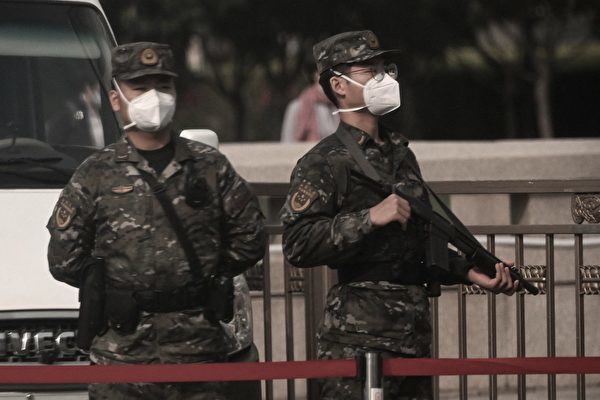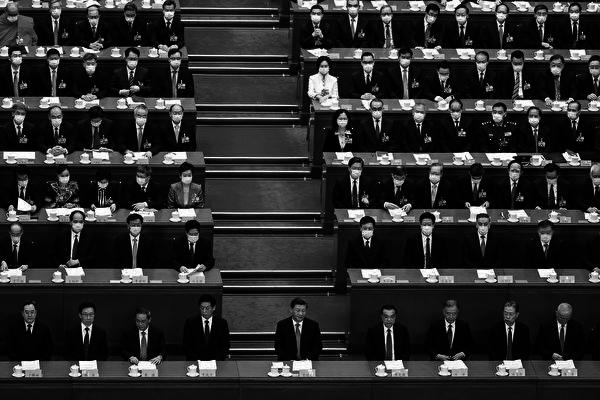BEIJING, CHINA - MARCH 11: China's President Xi Jinping (L) speaks with former Premier Li Keqiang (C) and National People's Congress Chairman Zhao Leji (R) during the fourth plenary session of the National People's Congress on March 11, 2023, in Beijing, China. China's annual political gathering, known as the Two Sessions, convenes the nation's leaders and lawmakers to set the government's agenda for domestic economic and social development for the next year. (Photo by Lintao Zhang/Getty Images)
[People News] On July 31, Shanghai entrepreneur Hu Liren once again made public a handwritten letter by former Chinese Premier Li Keqiang. According to Hu, this letter was written by Li to the people of Taiwan, expressing his genuine emotions, deep concerns about cross-strait relations, rational reflection, and a respectful, hopeful outlook toward Taiwanese society. In the letter, Li also revealed that he had advised Xi Jinping to abandon the idea of forcibly unifying Taiwan, but Xi insisted on a hardline approach.
Previously, Hu released a letter from Li to the people of China, as well as detailed notes Li wrote about the 2019 Hong Kong protests. This time, he has made public another historically significant document.
Hu stated that this letter is a personal letter handwritten by Li Keqiang to the people of Taiwan. It was never published during Li’s lifetime. It is neither an official document nor diplomatic rhetoric, but a sincere letter written during a time of political marginalisation. Below is the full text of the letter:
Dear People of Taiwan,
In this silent night, I take up my pen to write this letter—not as the Premier of the State Council, nor as a political figure within the system, but as an ordinary Chinese who has weathered storms, experienced both rise and fall, and who still holds hope for the future of democracy. I write to share with you the truest thoughts from the depths of my heart.
I know there lies between us a sea that grows ever deeper—separated by systems, by history, by the shadow of war, by fractured destinies, by misunderstandings and unease, and by the gap between once-held expectations and present realities. Taiwan has never been an ordinary land. It is the first region in the Chinese-speaking world to complete a democratic transition; it is a mirror of modern institutional civilisation; it is a presence both distant and intimately familiar to many intellectuals on the mainland.
The reason you hold firm to your identity is because you understand that the value of freedom lies not in slogans, but in a genuine vote, in the freedom to criticise those in power, and in a sense of grounded dignity and justice in everyday life.
Countless times, I’ve pondered: If only we could do better—if the mainland’s system could truly embody the rule of law, fairness, freedom, and humanistic values—could we not win trust and understanding not through force, but through the warmth of our institutions and the appeal of our culture? This is not a utopian dream—it’s a direction I have always believed in and pursued during my tenure, though I was never able to achieve it.
I once promoted the “31 Measures for Taiwan,” opening up areas like education, healthcare, research, and employment, hoping that through practical efforts, young Taiwanese would voluntarily come to the mainland, settle, and build their lives.
I have always believed that unification must rely on institutional appeal, not coercion, and certainly not on plunder or conquest. Sadly, I failed. I watched as rigid institutions and progressive thought in society began to corrode public trust. I saw Hong Kong—a once free and open city—become shrouded in silence and fear. I saw media silenced, young people subdued, and a country that once had a shot at modern civilisation veer off into authoritarian fear and control.
Meanwhile, I saw the Taiwanese public becoming increasingly wary and alert at the mention of “unification.” I understand your doubts and resistance—not because you don’t want closeness, but because we have not become worthy of trust. What pains me even more is that certain Taiwanese politicians, cloaked in the name of “peaceful reunification,” travel frequently between the two sides, claiming to promote cooperation while pursuing personal gain and corruption. These individuals are not bridges of dialogue or envoys of peace, but saboteurs of trust. I feel only contempt and disappointment toward them. They tarnish the name of “unification” and drown out genuine voices for dialogue and reason. When “unification” becomes a game for the few to profit from, the path can no longer lead to true reconciliation.
In recent years, calls for military unification have grown louder, with frequent drills and fighter jets crossing the strait. Political programs are filled with martial rhetoric and bloodthirsty vows. But can any of this truly build trust between us?
In one national security meeting, I spoke plainly: “When a system loses the people’s hearts, it loses the nation. War may destroy the body, but it cannot conquer the soul.” But these words ultimately could not sway the top decision-maker’s set course. Hardline stances became the only permitted expression, while restraint was viewed as weak and untrustworthy.
Today’s mainland has already strayed far from the vision I once held. I know well that my chances to speak out are dwindling. So I write this letter—not to defend myself, nor to promote anything—but to leave behind a voice, the voice of one Chinese person who tried to speak the truth.
To the people of Taiwan, I want to say: Unification should not be a command; it should be an invitation—one that you have every right to accept or reject. Not all mainlanders long to suppress you with force. Not all have abandoned reason and civilisation. What you are defending is something we have never truly had, yet always longed for: a system of freedom, law, and dignity.
If one day, this country truly walks the path of law, freedom, and reason, perhaps then, we will no longer be people staring across the shore from opposite sides. Perhaps then, we can meet on equal footing, with shared values, and face each other without fear or hostility.
That, to me, is the true meaning of unification. I write this letter not to indulge in fantasy, nor to gloss over history’s cracks, but to leave a trace in this era of silence. We could have chosen another path—a path of respect, understanding, and civilisation. A path that avoided conflict and division. But in the end, we took another route, one filled with coercion and mistrust. And what it brings is not unification—but deeper separation.
If China’s future still holds space for reflection, remember this: In an age of high walls and suppressed voices, someone tried to open a window and let in a different light. May you remain safe, resolute, and free.
And may the next generation—ours and yours—grow up in a world without enmity, where we meet as equals, without prejudice, and walk into history together.
Spring 2023
Written by Li Keqiang on a winter-like, silent night
Hu Liren also stated that Li Keqiang left behind a large number of private notes, speech transcripts, and handwritten letters before his death. The collection exceeds 500 documents, covering major policy reflections, personal insights, and concerns and hopes for China’s future. The most valuable of these materials is being preserved by a close confidant, and Hu intends to publish them gradually in a series titled “The Real China.” △









News magazine bootstrap themes!
I like this themes, fast loading and look profesional
Thank you Carlos!
You're welcome!
Please support me with give positive rating!
Yes Sure!